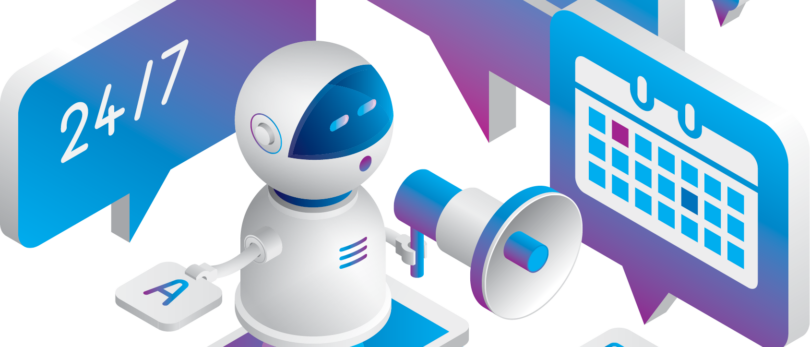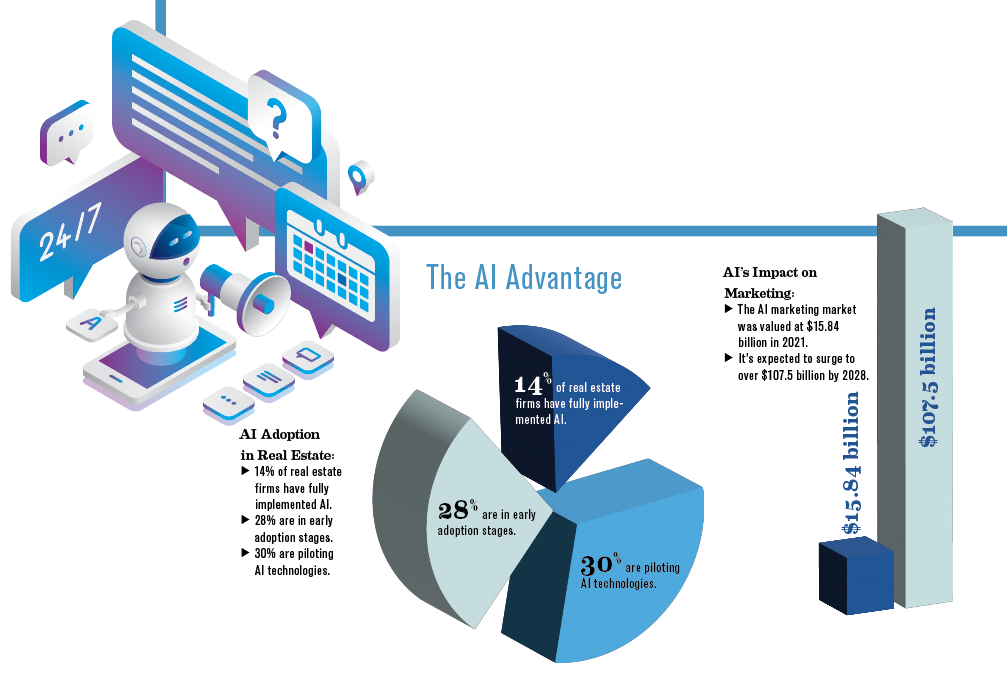By Bradford Masoni
Artificial intelligence (AI) is no longer a futuristic concept.
It’s a powerful tool that real estate professionals are using today to streamline marketing, engage clients and gain an edge in a competitive market. From content creation automation to real-time market trend analysis, AI helps agents work smarter and more efficiently.
But AI isn’t here to replace the human connection that defines real estate. Instead, it acts as a powerful assistant—handling repetitive tasks, refining marketing strategies and freeing up agents to focus on building relationships and closing deals.
So, how can agents use AI to generate leads, create compelling marketing content and scale their business—regardless of team size? Two top-producing agents share how AI is transforming the way they work.
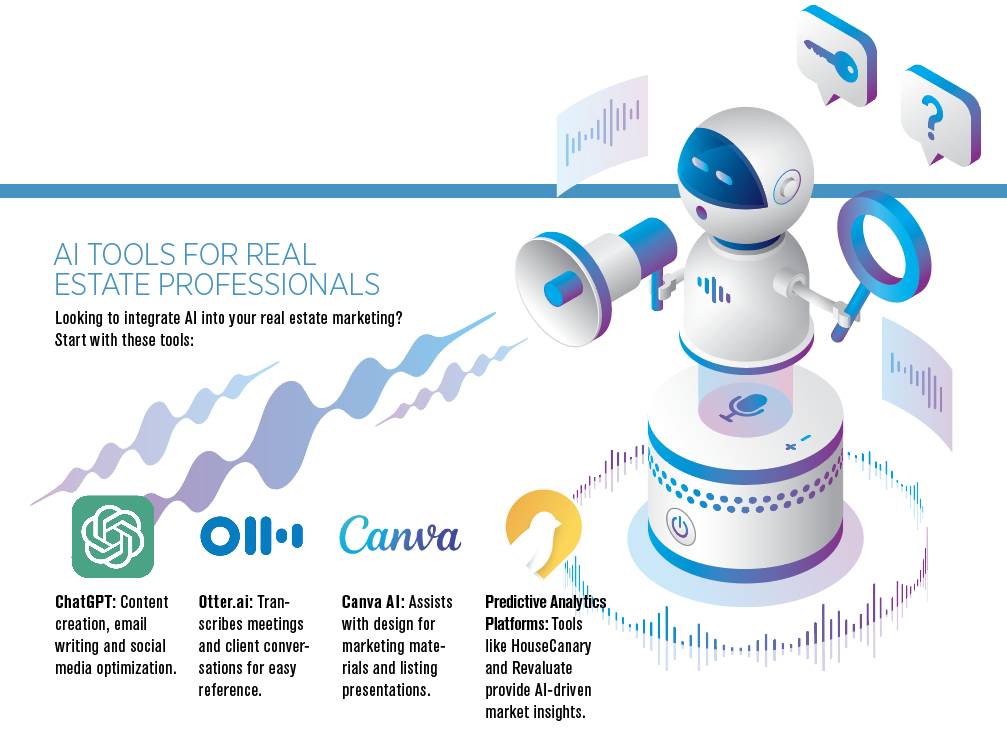 AI for smarter lead generation
AI for smarter lead generation
Finding high-quality leads has always been one of the biggest challenges for real estate professionals. AI-driven tools are changing that by analyzing user behavior, search history and market trends to identify buyers and sellers before they even reach out.
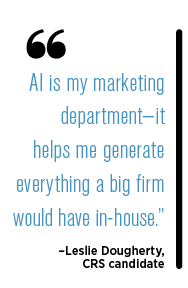
“AI helps me determine where to advertise and what type of voice to use for my listings,” says Leslie Dougherty, CRS candidate, broker-owner at Central Coast Sotheby’s International Realty in San Luis Obispo County, California. “I can ask AI to analyze market data and suggest the best marketing strategies for different types of homes.”
How can AI enhance lead generation?
- Predictive analytics – AI evaluates market trends and client behavior to identify high-intent buyers and sellers.
- AI chatbots – Automated assistants handle initial inquiries, provide listing details, and qualify leads 24/7.
- Targeted social media campaigns – AI refines ad targeting based on engagement patterns, increasing click-through rates.
Nicole Serviss, CRS, founder of The Serviss Group with RE/MAX Elite in Snohomish, Washington, says AI is her virtual assistant: “AI does the first 85% of the work for me—analyzing spreadsheets, pulling property data, and even running market analysis to identify leads. Then, I fine-tune the details and focus on client engagement.”
Automating content creation
Creating high-quality marketing materials is time-consuming, but AI helps agents generate polished listing descriptions, social media posts, email campaigns and newsletters quickly and efficiently.
“I use AI for almost everything—writing newsletters, updating email templates and even finessing my social media content to maximize engagement,” Serviss says. “It helps me stay consistent without spending hours writing and rewriting copy.”
Just a few of the top AI-powered content tools for real estate agents include:
- MLS data summaries – AI scans MLS listings to generate feature highlights, pricing trends and market insights.
- Social media optimization – AI suggests captions, hashtags and post formats for better engagement.
- Automated email campaigns – AI personalizes emails based on past client interactions and preferences.
Dougherty adds, “AI helps my social media posts stand out by suggesting language, icons and hashtags I wouldn’t have thought to use. It increases my reach and engagement on platforms like Facebook and Instagram.”
A competitive edge for smaller teams
For solo agents and small brokerages, AI levels the playing field. By automating tasks that large teams typically handle, AI allows independent agents to focus on providing a more personalized experience.
“As a small brokerage, AI is my marketing department,” Dougherty says. “It helps me generate listing presentations, scripts and business plans—everything a big firm would have in-house.”
Serviss sees AI as a way to enhance, rather than replace, personal engagement: “I use AI to craft emails that feel customized to each client, highlighting what makes a home special. Large firms often rely on templated messaging, but AI lets me create tailored marketing that resonates.”
Avoiding AI pitfalls
AI can be a game-changer, but it’s important to use it wisely. One of the biggest mistakes agents make is over-relying on AI-generated content without reviewing it for accuracy.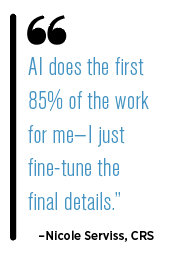
“You can tell when an MLS description has been written by AI—sometimes it gets things wrong, like calling a home ‘private’ when it’s actually next to a hotel,” Dougherty says.
Another challenge is depersonalization. “AI chatbots and automation are great for efficiency, but they should never replace human interaction,” warns Serviss. “Clients want to feel like they’re working with a real person, not a machine.”
Best practices for using AI responsibly
- Always review AI-generated content before publishing.
- Use AI to enhance, not replace, human connections.
- Train AI tools with your unique voice for authenticity.
- Stay updated on AI advancements and best practices.
What’s next for AI in real estate?
AI is continuing to evolve, offering even more opportunities for real estate marketing. Upcoming trends include:
- Voice & visual search optimization – AI is making it easier for buyers to find homes using voice assistants and image recognition.
- Hyper-personalized marketing – AI will generate even more customized recommendations based on client behaviors.
- AI-generated video & virtual tours – Listings will feature AI-created video walkthroughs and interactive tours.
“AI isn’t something to be feared; it’s a tool that, when used effectively, can revolutionize how we market properties and connect with clients,” Dougherty says.
Final thoughts: embrace AI for a smarter future
AI is transforming how real estate professionals market their services. Whether it’s streamlining lead generation, automating content or allowing smaller teams to compete with larger firms, AI helps agents work smarter, not harder.
By using AI responsibly—blending automation with personalization—agents can stay ahead of industry shifts and deliver better results for their clients.

